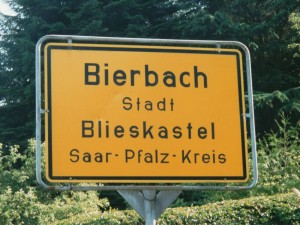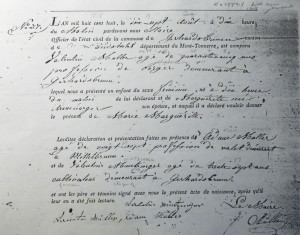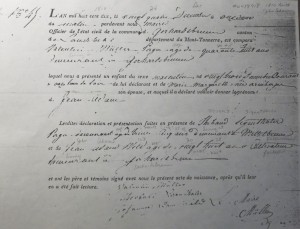Seriously? The extremely common German name of Müller has a connection to France? Yes, to be sure.
Last week, Karen’s Chatt received July 4th greetings from Marie, a French researcher with a Bierbach Müller connection. Her comment was written in French. No, I do not read French, but thanks to Google Translate I am able to understand what her message said. We may be distant cousins, but since Müller is such a common German name, I am not so sure. It appears that her Müllers settled in Bierbach before my Müllers. There may be a connection somewhere down the line, well before that time.
Bierbach, the native town of my great-grandfather Jacob Müller/Miller, is close to France. According to my ADAC Maxi Atlas, Bierbach is a little over eight miles from the French border. Bierbach is in the Rhine Pfalz area of what was once the Kingdom of Bavaria.
Before 1800, what we now call Germany consisted of numerous kingdoms, duchies and principalities. In the late 1700s Napoleon invaded and controlled the Rhine Pfalz area of Germany and all Germanic lands west of the Elbe River. The area remained under French control until 1815, when Napoleon was defeated.
What is interesting and important to those who have ancestors from this area is that Napoleon required that civil records be kept in the areas he conquered. Before that time only the churches recorded births, marriages and deaths. This means that the Rhine Pfalz, which included Bierbach, was one of the earliest areas of Germany to have civil records. It is always good to have an additional group of records to search.
I found a couple French civil records when researching my Müllers of the Bierbach area. Jacob Müller’s father, Johann, was born in Gerhardsbrunn in 1816 to Valentin and Margarethe (Armberger) Müller. Gerhardsbrunn is about 14.5 miles northeast of Bierbach and was under French rule until 1815. Valentin and Margarethe lived in Gerhardsbrunn from about 1808 to sometime after 1816.
At the end of the Napoleonic Era the German language started to replace French. As a result, Johann’s 1816 birth record was written in German. However, two of Johann’s siblings were born in Gerhardsbrunn a few years earlier and their civil birth records were written in French. These German and French records have been microfilmed and I ordered them from the Family History Center in Lima several years ago.
Marie Marguerite Müller was born 17 August 1808 in Gerhardsbrunn to Valentine and Marguerite (Armberger) Müller. [1]
Jean Adam Müller was born 24 December 1810 in Gerhardsbrunn to Valentin and Marguerite (Armberger) Müller. [2] Jean is the French form of John.
By 1876 all of Germany kept civil records but the dates that civil record-keeping began vary with the area. Below is a basic time-table of civil records in Germany:
- 1792–Alsace-Lorraine
- 1798–Bacen, Rhein Pfalz
- 1803–Hessen-Hassau
- 1808-09–Westfalen, Hamburg, Hannover
- 1810-11– Baden, Oldenburg
- 1850–Anhalt
- 1866–Bremen
- 1874–Prussia
- 1876–All of the German Empire
There is no central repository in Germany for civil records. Instead, civil registers are kept at the Standesamt [registry office] and contain records of births, deaths, marriages and children. Once the registry records are no longer considered current they are transferred to the Standtarchiv [city archive] or Kreisarchiv [county archive for a small town or village that does not have its own archive].
Ministers continued to keep parish registers after civil records were started. Although the parish records may not have been as detailed as they once were, the civil records seemed to continue where they left off. For example, some parish registers give only the baptism date, not the date of birth. And the civil marriage record of my great-great-grandparents Johann Müller and Marie Kessler contains a lot of information and detail.
Personally, I find civil records a little more difficult to read than church records. Especially when they are written in French!
[1] Zivilstandsregister, 1798-1957, Gerhardsbrunn, Bayern, Standesamt. FHL microfilm 1488918. Family History Library, Salt Lake City, Utah. [Marie Marguerite Müller birth, 1808.]
[2] Zivilstandsregister, 1798-1957, Gerhardsbrunn, Bayern, Standesamt. FHL microfilm 1488918. Family History Library, Salt Lake City, Utah. [Jean Adam Müller birth 1810.]






1 comment
While the geography certainly makes the connection reasonable, the long history of bad blood between the French and Germans makes the idea somewhat less plausible. A few years ago we visited Paris to find that contray to all the warnings before leaving, the French (even in Paris) were kind, welcoming and even generous toward us. We speak no French and in fact made several embarassing miss-statements even trying. Yet folks on the street were happy to help, speak and share. However, our hotel (small place) manager reacted rather strongly when we commented that he could communicate well in English and apparently German as many loud Germans were also guests. His response, while polite, made it clear he did not know or use any German.
Although several trips to France have always met with kind, helpful and accepting people, I can not say the same for Germany, home of nearly all my family ancestors.